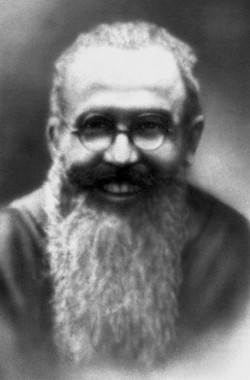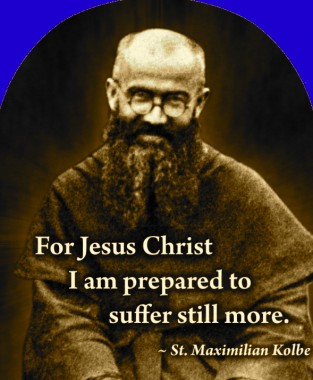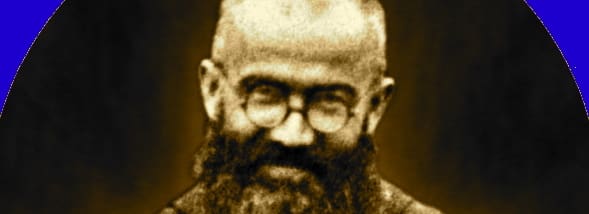St. Maximilian Kolbe: Martyr of Charity and True Friend of Christ
This is my commandment, that you love one another as I have loved you. Greater love has no man than this, that a  man lay down his life for his friends . . . This I command you, to love one another. (John 15:12-13, 17)
man lay down his life for his friends . . . This I command you, to love one another. (John 15:12-13, 17)
These words of Christ come during his farewell discourse to His Apostles on Holy Thursday, immediately before He embraces His Passion and Death. And these words provide a beautiful summary of why St. Maximilian Maria Kolbe was proclaimed the first “Martyr of Charity” in the history of the Church. They succinctly describe the kind of priest St. Maximilian Kolbe was and serve as an excellent opportunity, in light of Kolbe’s witness, to reflect on the question: “What does it mean to be a true friend of Christ’
Because these words were said during his last will and testament on Holy Thursday, they are of extreme importance. This is the night when Jesus would institute the sacred priesthood , the Sacrament of the Holy Eucharist and call his disciples “friends” for the first time.
We can synthesize the interconnected meaning of these actions of Christ by looking at the life of St. Maximilian. Many are familiar with his story of heroic virtue when he gave his life for a total stranger in the death camp of Auschwitz. Less are familiar with the true motives of Kolbe’s actions, which are summarized by his response to the Nazi commandant when offering his life for the life of condemned prisoner: “I am a Catholic priest.”
Both Pope Paul VI and now Pope St. John Paul II, the two popes responsible for the beatification and canonization of St. Maximilian, recognized in these words that St. Maximilian truly understood his vocation to be what Venerable Fulton Sheen would frequently call the “Priest-Victimhood” of Christ. St. Maximilian understood that the moment he was ordained to the priesthood (on the feast day of St. Louis de Montfort, a kindred Marian spirit), he was called to live out in a special and unique way the love of Christ which was demonstrated, above all, by his self-emptying [St. Paul uses the Greek word “kenosis” to refer to this in Phil 2:7) and sacrificial offering of himself for the salvation of the world.
These words describe the true meaning of the word “agape” which Jesus uses when referring to this kind of love in St. John’s Gospel. It refers to a supernatural, self-sacrificing kind of love that has a profoundly redemptive purpose behind it. And St. John specifically uses this powerful Greek verb when he quotes Jesus saying: “This is my commandment, that you love [agapate] one another as I have loved you” (John 15:12). Jesus introduces a new commandment based on a new love of neighbor that supercedes what was commanded in the Old Law: you shall love your neighbor as yourself, which is the greatest love that exists on the natural level.
Jesus, however, is announcing that loving as he loves, a supernatural (Divine), self-sacrificing kind of love will now be possible for his disciples. How? By his imminent Passion and death on the Cross, from where he will literally pour himself out upon the Church and all humanity when His side (as Hebrews 10:20 puts it, “the curtain of his flesh”) is opened with a lance and the life-giving water (Baptism) and Blood (Eucharist) of the Savior now flows upon the world.
Jesus uses a form of “agape” again in the following verse when he says: “Greater love [agapen] has no man than this, that a man lay down his life for his friends.,” and then again in verse 17: “This I command you, to love [agapate] one another.” These powerful words bookend the key verse where Jesus, for the first time, calls his Apostles “friends”.
The setting of the Last Supper and all that Jesus instituted during it, provides the full context and meaning of Jesus’ bestowal of the title “friend” on His Apostles [and disciples). Jesus is clearly revealing that anyone who wants to be found worthy of being called His “friend” would need to love with the love He is about to show the world when he embraces His Passion and Death for the redemption of the world. In other words, a true friend of Christ, especially those called to Holy Orders, are called to a supernatural, self-sacrificing love which is given for the life of the world – agape love. This is what separates Christ’s priesthood from every other priesthood: the fact that Jesus is not just a priest who offers the victim–Jesus is the Victim and the love by which He loves the world, but is also this priest-victimhood lived out with this Divine, self-sacrificing type of love. And since all Christians are baptized into the priesthood of Christ, we are called to live out within our own state of life, this supernatural, self-sacrificing priest-victimhood of Christ for the salvation of our families, our religious communities, etc. This is why St. Maximilian was always so close to the Blessed Virgin Mary – because he was always standing next to her at the foot of the Cross, where the true sons and daughters of Mary are found.
 In English, we call this love charity because it only comes from God. And the world is blessed to witness this charity lived out in the most hellish of places, a death camp, through the witness (martyrdom) of St. Maximilian Maria Kolbe, whose supernatural, self-sacrificing love for a stranger moved him to give his life for him. And as Cardinal Karol Wojtyla said before he became pope: “The fact is, and all the survivors of Auschwitz know it, that from Assumption day, 1941, on, the camp became a somewhat less hellish place.”
In English, we call this love charity because it only comes from God. And the world is blessed to witness this charity lived out in the most hellish of places, a death camp, through the witness (martyrdom) of St. Maximilian Maria Kolbe, whose supernatural, self-sacrificing love for a stranger moved him to give his life for him. And as Cardinal Karol Wojtyla said before he became pope: “The fact is, and all the survivors of Auschwitz know it, that from Assumption day, 1941, on, the camp became a somewhat less hellish place.”
May this great “martyr of charity”, true priest and victim of Christ, remind and inspire us to that love which “true friendship” with Christ demands, that perfect love which removes all fear and hatred; an agape love which makes the world a less hellish place.
St. Maximilian Maria Kolbe, pray for us!
This post originally appeared on “The Catholic Hour”. Used with permission of Dr. Howard.
+
Art: Photographs of St. Maximilian Kolbe courtesy Dr. Peter Howard, used with permission [minor modifications].




